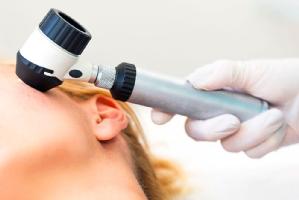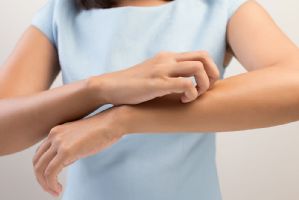
What is Melanoma?
Melanoma is a dangerous type of skin cancer with the ability to rapidly spread to other organs if not treated in the early stages. Even though there are several types of skin cancers, melanoma is one of the most common.
Ultraviolet (UV) radiation from the sun or tanning beds causes skin damage that triggers special skin cells to produce more melanin. This darkens or tans the skin as a protective measure. Over time, the damage from UV radiation triggers changes in the melanin-producing skin cells, resulting in uncontrolled cellular growth.
Melanoma growths come in many different shapes, sizes, and colors, so spotting the warning signs can be tricky. Detecting melanoma early is vital, but you can use the "ABCDEs of Melanoma," which provide some guidance:
- Asymmetry: Most melanomas are asymmetrical
- Border: Melanoma borders tend to be uneven and may have scalloped or notched edges
- Color: Multiple colors are a warning sign
- Diameter or Dark: Lesions larger than the size of a pencil eraser or ones darker than others
- Evolving: Any change in size, shape, or color
Over 5 million individuals are diagnosed with skin cancer each year in the United States. It is the most common type of cancer. But there is hope in those staggering numbers because most cases of skin cancer are preventable.
Create a routine for sun safety and early intervention. Protecting your skin involves a combination of safety methods because no one method provides 100% protection. These include:
- Apply a broad-spectrum sunscreen with an SPF of 30 or higher when outdoors.
- Reapply every two hours or after swimming or sweating excessively.
- Dark, thicker fabric offers the best protection.
- Don't forget a wide-brimmed hat and sunglasses.
- Clothing with a UPF of 50 or more provides excellent protection, too.
- Seek shade when possible and avoid being in the sun for long periods during the strongest UV rays (10 am-4 pm).
Skin cancer is something you can see and is highly curable when found early. Monthly head-to-toe self-skin checks help you spot any new, changing, or unusual spots. If you find any concerns, contact OakLeaf Clinics - Dermatology to request an appointment to get it checked out by one of our experts.

Related Articles

Dermatology
Mohs Surgery
Mohs micrographic surgery is considered the most effective technique for treating many basal cell...

Family Medicine
Acne: More Common Than You Think
Acne is the most common skin disorder in the United States, affecting 40 to 50 million people of all...

Pediatric Medicine
Rashes on Amoxicillin: When is it a True Allergy?
Rash while taking Amoxicillin or Augmentin is common; 5-10% of children taking Amoxicillin or...

Pediatric Medicine
Hives
What do hives look like? Hives are raised, red areas that are very itchy. They may sometimes have a...
